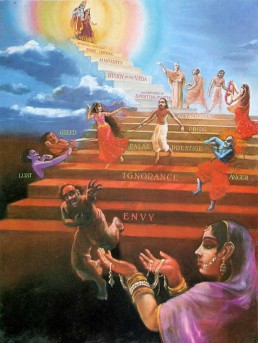In the previous verse Sri Krishna talked of those who can successfully transcend their own subjective delusion. In this verse He gives the negative nature in those who cannot overcome this delusion for realizing the Divinity in themselves.
He says that low men because of their delusion and indulgence in evil actions, follow the path of the devil (Asura) and get themselves deprived of their discrimination. The difference between man and animal is his rational intellect by which he can distinguish between the good and the evil, the high and the low, the moral and the immoral etc. This rational discriminative capacity alone helps the man to cast off his imperfections and become aware of his essential nature of Absolute Divinity.
The evil doers cannot attain to the Supreme, for their mind and will are not instruments of the Spirit but of the ego. They do not seek to master their crude impulses but are a prey to the Rajas and Tamas in them. If they control their crude tendencies by the Sattva in them, their action becomes orderly and enlightened and ceases to be the outcome of passion and ignorance.
To go beyond the three gunas, first, we have to submit ourselves to the rule of Sattva. We have to become ethical, before we can become spiritual. At the spiritual level, we cross the dualities and act in the light and strength of the Spirit in us. We do not act then to gain any personal interest or avoid personal suffering but only as instrument of the Divine.
Concepts and Issues
The Lord says that He is of two kinds of nature viz. Lower nature (Apara Prakriti) and Higher Nature (Para Prakriti). The lower nature is divided eightfold. They are 1.earth
2.water 3.fire 4.air 5.space 6.mind 7.intellect and 8.egoism. The higher nature is the fundamental factor, the substratum the very life-principle with which the entire universe is sustained- The Atman, The Self, Consciousness.
The lower nature is Matter and the higher is Spirit. The Universe has manifested from these two kinds of nature only. The Lord says that in His higher nature He is the sole cause and ultimate support of the entire creation. The universe is His manifestation and is pervaded by Him. He is the essence that is running through everything, holding them together into this world pattern, as a string keeps the pearls together in a necklace.
To make this idea very clear to Arjuna, The Lord gives several examples like He is the light in the Sun and the Moon, sacred symbol of `OM’ in the scriptures, manliness in man, life-breath in all living creatures etc. He declares that He is present in all things in the universe, visible and invisible, and is the root cause for the entire creation. He is the all Sustaining and ever Surviving Substratum of everything.
The Lord embraces Matter only to express Himself, His glory, His strength and His greatness. All the beings – pure, active and inert – are only His creations. He guides them and they don’t guide Him. He does not take refuge in them but they take refuge in Him. The naked eye sees the Spirit encased in the matter but once the vision improves through knowledge, it sees and apprehends that the Spirit envelops everything. Matter depends on the Spirit. But the Spirit does not depend upon the Matter.
In all beings the three Gunas – Sattva (pure attitude), Rajas (active attitude) and Tamas (inert attitude) are found in varying degrees. The blending of these three qualities of nature in the thought mechanism of man constitutes ignorance or Avidya due to which the whole world gets deluded. Because of this total ignorance or Maya the world fails to recognize His presence – the Eternal, the Imperishable, the Spirit as distinct from the gross Matter.
The ignorant believe that the world and the visible objects alone are real and do not seek The Lord at all. They follow the ways of demons and suffer through the series of births and deaths. It is very difficult to remove ignorance and get enlightened. But inspite of this difficulty those who take refuge in Him can overcome the predicament.
Live as the Gita Teaches You to Live
The following concepts have to be clearly understood.
Creation
Three Gunas
Maya
The Lord permeates every thing in the universe.
Means to go beyond the Gunas
How to realize the self?
Points to Ponder
What are the eightfold divisions of Prakriti?
Describe the higher and lower nature of The Lord.
Describe the mechanism of creation.
How the Lord permeates the entire universe?
Why people are not aware of the substratum of the universe?
How one can come out of this delusion?
How one can realize the Self despite difficulties?
N. B. A few charts are given in the Annexure to facilitate easy comprehension of the concepts discussed in this Chapter.
Next time we will proceed from the Verse 7.16
HARIH OM

